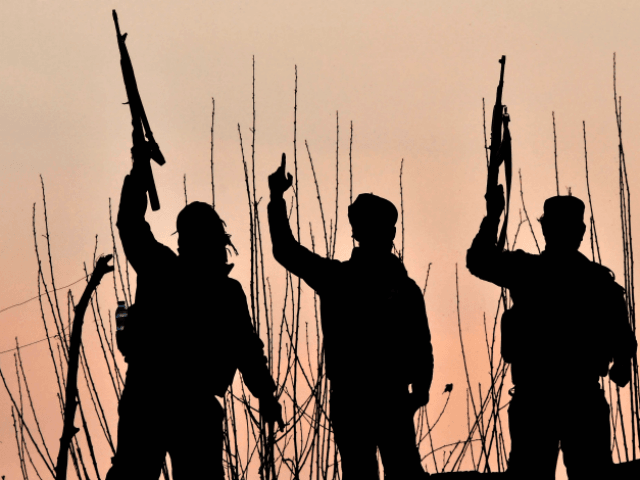Armenian Ambassador to Moscow Vardan Toganyan accused the government of Turkey on Monday of shipping battle-hardened Syrian jihadis to Nagorno-Karabakh, a disputed region between Armenia and Azerbaijan where fighting erupted this weekend.
Nagorno-Karabakh is a separatist region that considers itself an unrecognized sovereign state. Its population is majority Armenian, though Azerbaijan claims it. While clashes occasionally erupt there, the situation became deadly this weekend; both sides claim the other shot first and declared martial law. Initial reports indicated that at least 23 people died in the weekend fighting.
Both Azeri and Armenian officials reported extensive fighting continuing overnight into Tuesday. Some reports indicate that as many as 100 casualties exist, many of them civilians.
Toganyan told reporters on Monday that he believed Turkey had sent Syrian fighters to the disputed Caucasus border area, placing the number of these fighters in the region at about 4,000 so far. Azeri officials have denied the claim – calling it “complete nonsense” and arguing that they have no need for reinforcements – but Turkish officials have not.
Turkey is extensively involved in multiple war fronts, including Syria and Libya. In Syria, it has collaborated with fighters belonging to the former Free Syrian Army and Sunni jihadist organizations like the Nusra Front, an offshoot of al-Qaeda now known as Tahrir al-Sham. Turkish President Recep Tayyip Erdogan is a vocal opponent of Syrian dictator Bashar al-Assad, an Alawite Shiite Muslim, and has repeatedly called him a “terrorist.” Assad has likewise referred to the Turkish invasion of his country as terrorism.
Reuters, noting Toganyan’s accusation, reported that Syrian fighters personally said they were traveling to Azerbaijan on Turkey’s behest, though the news agency could not independently confirm their testimonies.
“I didn’t want to go, but I don’t have any money. Life is very hard and poor,” a Syrian fighter en route to Azerbaijan told Reuters, claiming he would receive $1,500 a month for fighting. Another Syrian fighter estimated that about 1,000 fighters in Syria were planning the move to Azerbaijan.
The U.K. Guardian similarly cited three unnamed Syrian fighters collaborating with the Turkish government against Assad who said they were working for a private Turkish security firm, not Erdogan’s government, to fly into Azerbaijan. The Guardian report claimed that Turkey started recruiting fighters for Azerbaijan a month ago, some months after Azerbaijan threatened to bomb Armenia’s nuclear power plant, Metsamor, considered one of the world’s most dangerous:
Two brothers living in Azaz, Muhammad and Mahmoud, who asked for their names to be changed because of the sensitivity of the issue, said they were summoned to a military camp in Afrin on 13 September.
On arrival they were told by a commander in the Turkish-backed Sultan Murad division that work was available guarding observation posts and oil and gas facilities in Azerbaijan on three or six month contracts at 7,000-10,000 Turkish lira (£700-£1,000) a month – significantly more than they could earn at home.
The commander did not give details on what the job would entail, how long the posting would be, or when they were expected to leave. The men are also not clear about the name of the Turkish security company, or who would be paying their wages.
Those testifying to being recruited have universally claimed they would be on guard duty, not fighting, but the Guardian noted that Syrian fighters recruited to fight in Libya said they similarly expected to be on guard duty but found themselves fighting on behalf of the internationally recognized government of that country, which is allied with Turkey.
Turkey has spent years involved in the Syrian civil war, arming Sunni fighters seeking to overthrow Assad. More recently, Ankara shifted its focus to fight the Syrian Defense Forces (SDF), a majority-Kurdish militia allied with the United States that played a pivotal role in the defeat of the Islamic State. Kurdish authorities have complained that the jihadis engaged in outrageous human rights atrocities in fighting the Kurds, including the desecration of women soldiers’ bodies.
When Erdogan announced Turkish involvement in Libya, where the internationally recognized government has struggled to keep Russia-backed warlord Khalifa Haftar from taking over Tripoli, he transparently admitted that Syrians would be fighting there.
“Turkey is there with a training force. There are also people from the Syrian National Army,” Erdogan said in February.
Reports from Libya in June indicated that Russia was also sending Syrian mercenaries into Libya to fight on Haftar’s behalf, Reuters reported that as many as 900 Syrians were fighting for Haftar thanks to Russia.
Erdogan rapidly expressed support for Azerbaijan following the eruption of violence in Nagorno-Karabakh this weekend.
“The Turkish people stand with their Azeri brothers with all our means, as always,” Erdogan asserted in a statement on Twitter.
His foreign minister, Mevlut Cavusoglu, said on Tuesday that Turkey would always be “beside Azerbaijan both on the battlefield and the negotiating table.”
Turkey considers Azerbaijan a sister nation given the ethnic Turkic background of most of the country and their shared Islamic faith. The founders of the Republic of Turkey committed the first modern genocide against the Armenian people – in addition to trying to eradicate Assyrian and Greek Christians from what became the current state of Turkey – in the early 20th century. Erdogan has consistently and vehemently denied the Armenian genocide throughout his tenure and the state of Turkey still does not recognize the atrocity, which resulted in the killing of 1.5 million Armenians – over half the population in the Ottoman Empire.

COMMENTS
Please let us know if you're having issues with commenting.